What Those Three Letters Really Mean in Modern Dating
If you’re wondering what does enm mean, here’s the quick answer: ENM stands for Ethical Non-Monogamy – a relationship style where people have multiple romantic or sexual partners with everyone’s full knowledge and consent.
Quick Definition:
– E = Ethical (honest, fair, respectful)
– N = Non (not limited to one person)
– M = Monogamy (exclusive romantic/sexual relationship)
You’ve probably seen those three letters popping up on dating profiles more often lately. And honestly, it makes sense – research shows that approximately 20% of people engage in some form of non-monogamous relationship during their lifetime.
But here’s the thing: ENM isn’t just about having multiple partners. It’s about doing it ethically – which means everyone involved knows what’s happening, agrees to it, and gets treated with respect.
The key difference? ENM is based on consent and communication, while cheating involves deception and broken agreements. Think of it as the difference between playing poker with all cards on the table versus hiding your hand.
This isn’t some fringe lifestyle anymore. Studies indicate that 3-7% of Americans are actively practicing consensual non-monogamy at any given time, with even higher numbers among younger adults who are challenging traditional relationship models.
Whether you’re curious about the concept, considering it for yourself, or just trying to decode what you’re seeing in the dating world, understanding ENM helps you steer today’s relationship landscape with more clarity.
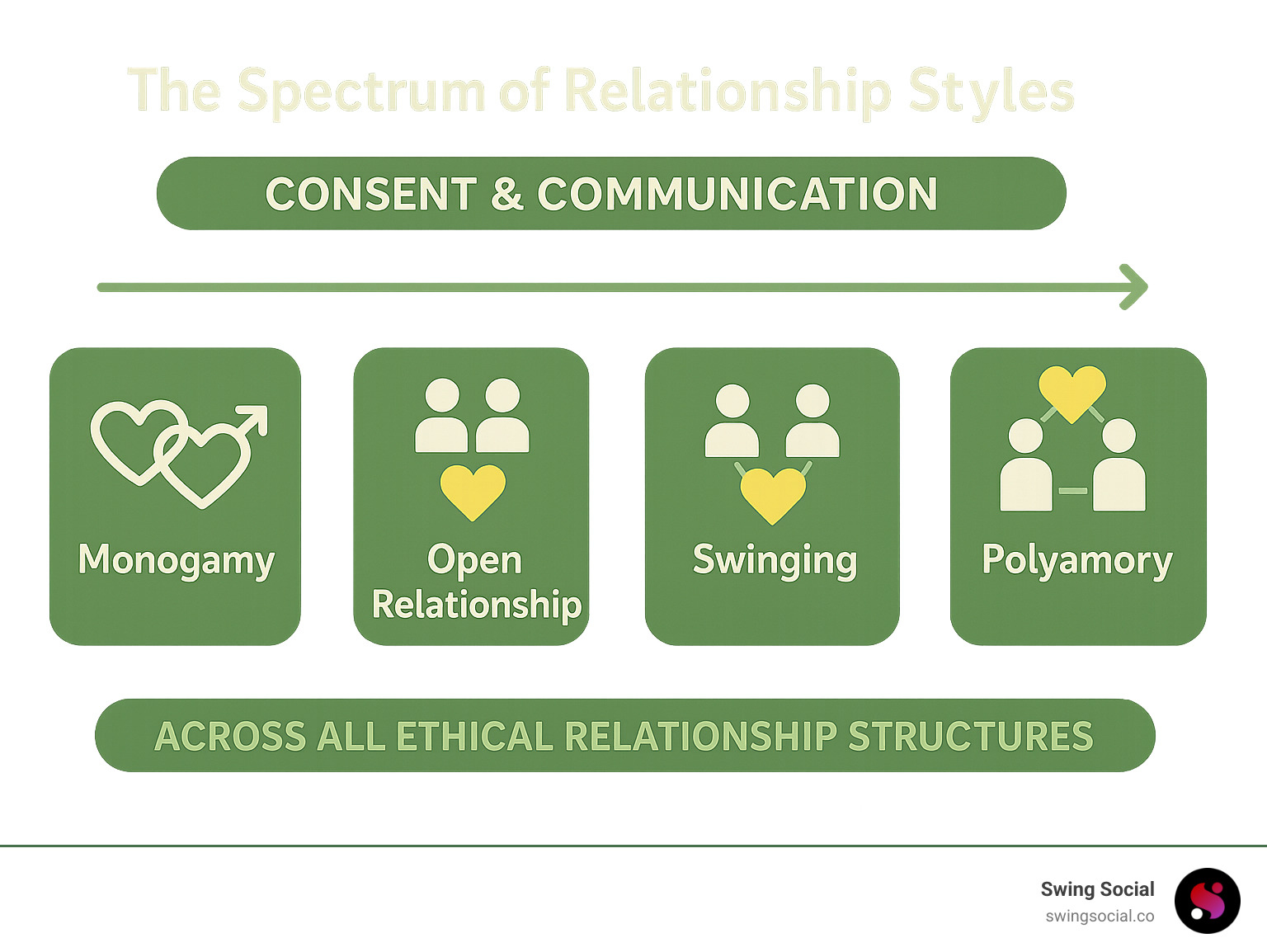
What Does ENM Mean?
Now that we’ve covered the basics, let’s dive deeper into what does ENM mean in practice. Ethical Non-Monogamy is like an umbrella on a rainy day – it covers lots of different relationship styles, but they all share one thing: everyone knows what’s happening and agrees to it.
Think of it this way: if traditional monogamy is like having one favorite restaurant you always go to, ENM is like being a foodie who enjoys different cuisines – but you’re totally upfront about it with everyone involved. No sneaking around to that secret taco place behind your partner’s back.
The “ethical” part isn’t just a fancy word thrown in to sound better. It’s the heart of what makes this work. When people practice ethical non-monogamy, they’re committed to explicit consent from everyone involved, honest communication about what they want and need, mutual respect for feelings and boundaries, and complete transparency about other relationships.
Here’s something that might surprise you: research shows that 21.9% of single Americans have tried consensual non-monogamy at some point. That’s more than one in five people! We’re definitely not talking about some tiny underground movement here.
The term itself grew out of the polyamorous community back when people needed a way to explain that their relationships weren’t secretive affairs or old-school polygamy arrangements. Unlike those situations, ENM puts equality and personal choice front and center for everyone involved.
What does ENM mean on dating apps?
When you’re swiping through dating profiles and see those three letters, the person is basically saying “here’s how I do relationships” right upfront. It’s like wearing your heart on your sleeve, but more like wearing your relationship style on your profile.
For the person who put ENM in their bio, they’re trying to attract people who get it and avoid awkward conversations later where they have to explain why they’re also dating Sarah from accounting. They’re showing they value honesty over surprises – which is actually pretty refreshing in the dating world.
For you as someone browsing profiles, seeing ENM tells you this person might already have other partners, they’re probably pretty good at communication (they have to be!), and they’re looking for connections with people who understand their relationship style.
Here’s a common misconception: ENM doesn’t automatically mean someone just wants casual hookups. Many people practicing ethical non-monogamy are looking for meaningful, loving relationships – they just don’t believe in limiting themselves to one person.
Safety tip: Always have detailed conversations about boundaries, expectations, and sexual health before meeting anyone from dating apps, especially when multiple partners might be in the picture.
What does ENM mean ethically?
The ethical foundation is what makes ENM actually work instead of turning into a hot mess. It’s built on some pretty solid principles that separate it from cheating or manipulation.
Honesty and transparency mean everyone knows the score. Your partners know about each other, understand what kind of relationships you have, and nobody’s being kept in the dark. It’s like playing cards with everyone’s hands face-up.
Informed consent goes way beyond just saying “okay” once. It means everyone involved has agreed to the arrangement with full understanding of what it means, and they can change their mind anytime. This isn’t a contract you sign in blood – it’s an ongoing conversation.
Equality and fairness ensure that while relationship structures might look different, everyone gets treated with respect and consideration. Nobody should be the “backup” person or feel like they’re getting the short end of the stick.
Autonomy means each person keeps their right to make their own choices about relationships, set their own boundaries, and walk away if things aren’t working for them anymore.
This ethical framework is what separates genuine ENM from situations where someone pressures their partner into non-monogamy or uses it as a fancy excuse to cheat. Real ethical non-monogamy requires emotional maturity, excellent communication skills, and genuine care for everyone involved – not just yourself.
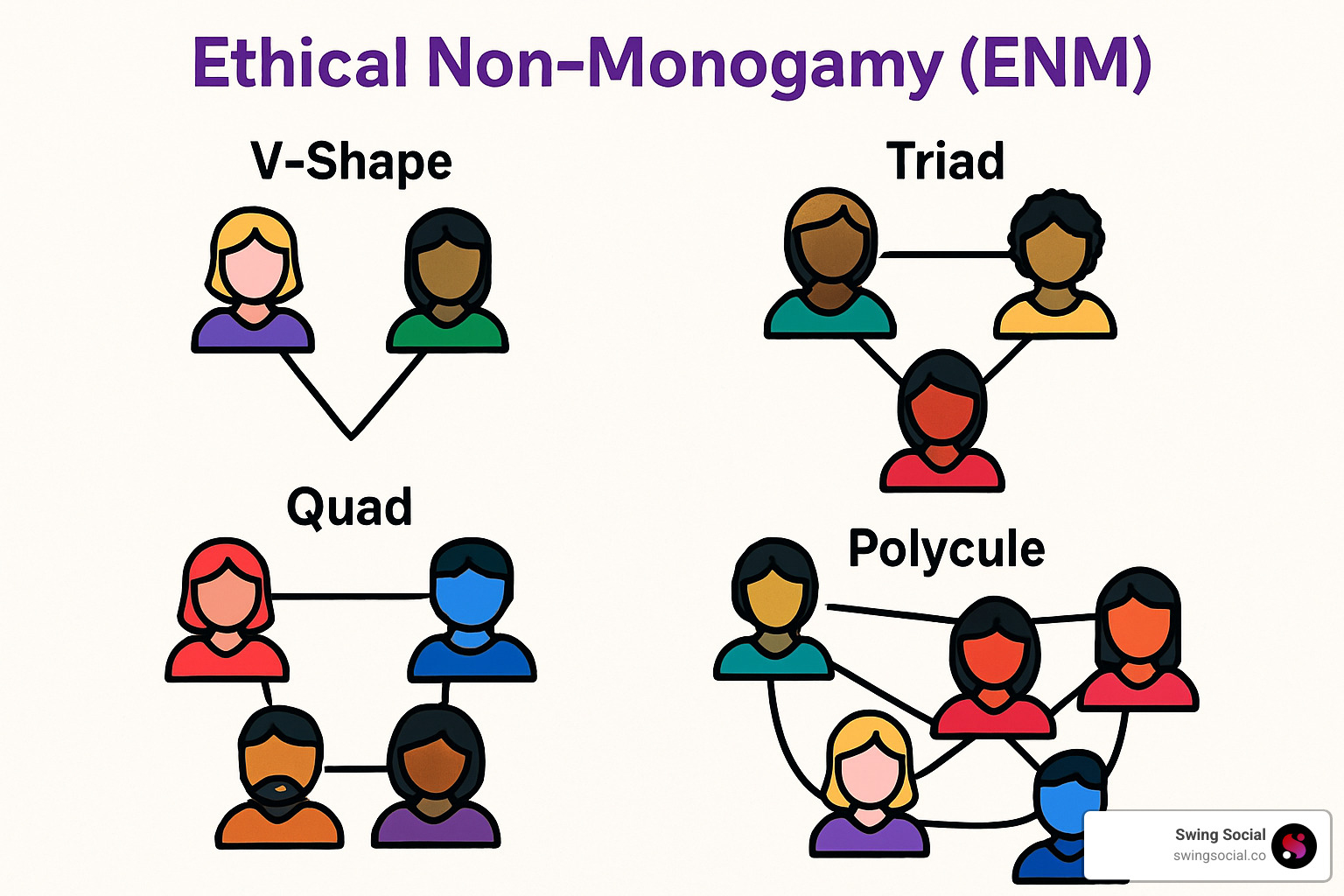
Common Forms of Ethical Non-Monogamy
ENM isn’t a one-size-fits-all concept. It’s more like an umbrella covering various relationship styles, each with its own characteristics and boundaries. Let’s explore the most common forms:
Polyamory involves having multiple romantic relationships with emotional commitment to each partner. This isn’t just about sex – polyamorous people often develop deep, loving connections with multiple individuals. Some practice hierarchical polyamory (with primary and secondary partners), while others prefer non-hierarchical approaches where all relationships are considered equal.
Open Relationships typically involve a committed couple who allow each other to have sexual encounters with other people. The primary relationship remains the emotional focus, but both partners have freedom to explore physically with others under agreed-upon rules.
Swinging is a form of ENM where committed couples exchange partners for sexual activities, often in social settings like parties or clubs. Swingers typically maintain their primary emotional bond while enjoying recreational sex with others in the lifestyle community.
Monogamish relationships are mostly monogamous with occasional exceptions. A couple might agree to allow outside encounters only when traveling, or perhaps once a year. It’s like monogamy with a safety valve.
Relationship Anarchy rejects traditional relationship categories altogether. Practitioners define each relationship individually without preset rules about what romantic, sexual, or platonic connections should look like.
Polyfidelity involves a closed group of people who are sexually and romantically exclusive to each other but not monogamous in the traditional sense. Think of it as expanded monogamy within a defined group.
Solo Polyamory describes people who have multiple relationships but don’t seek to merge their lives with partners through marriage, cohabitation, or shared finances. They maintain their independence while enjoying multiple connections.
Key Terms to Know:
– Metamours: Your partner’s other partners
– Compersion: Feeling joy when your partner is happy with someone else
– New Relationship Energy (NRE): The exciting, intense feelings at the start of a new relationship
– Polycule: The network of interconnected relationships in polyamory
Here’s how these different approaches compare:
| Relationship Style | Emotional Focus | Sexual Freedom | Typical Rules |
|---|---|---|---|
| Monogamy | One person | One person | Complete exclusivity |
| Open Relationship | Primary partner | Multiple people | Emotional exclusivity |
| Polyamory | Multiple people | Multiple people | Honesty, safer sex |
| Swinging | Primary partner | Shared experiences | Couple participation |
| Cheating | Deception | Hidden affairs | Broken agreements |
Core Principles & Emotional Skills for ENM Success
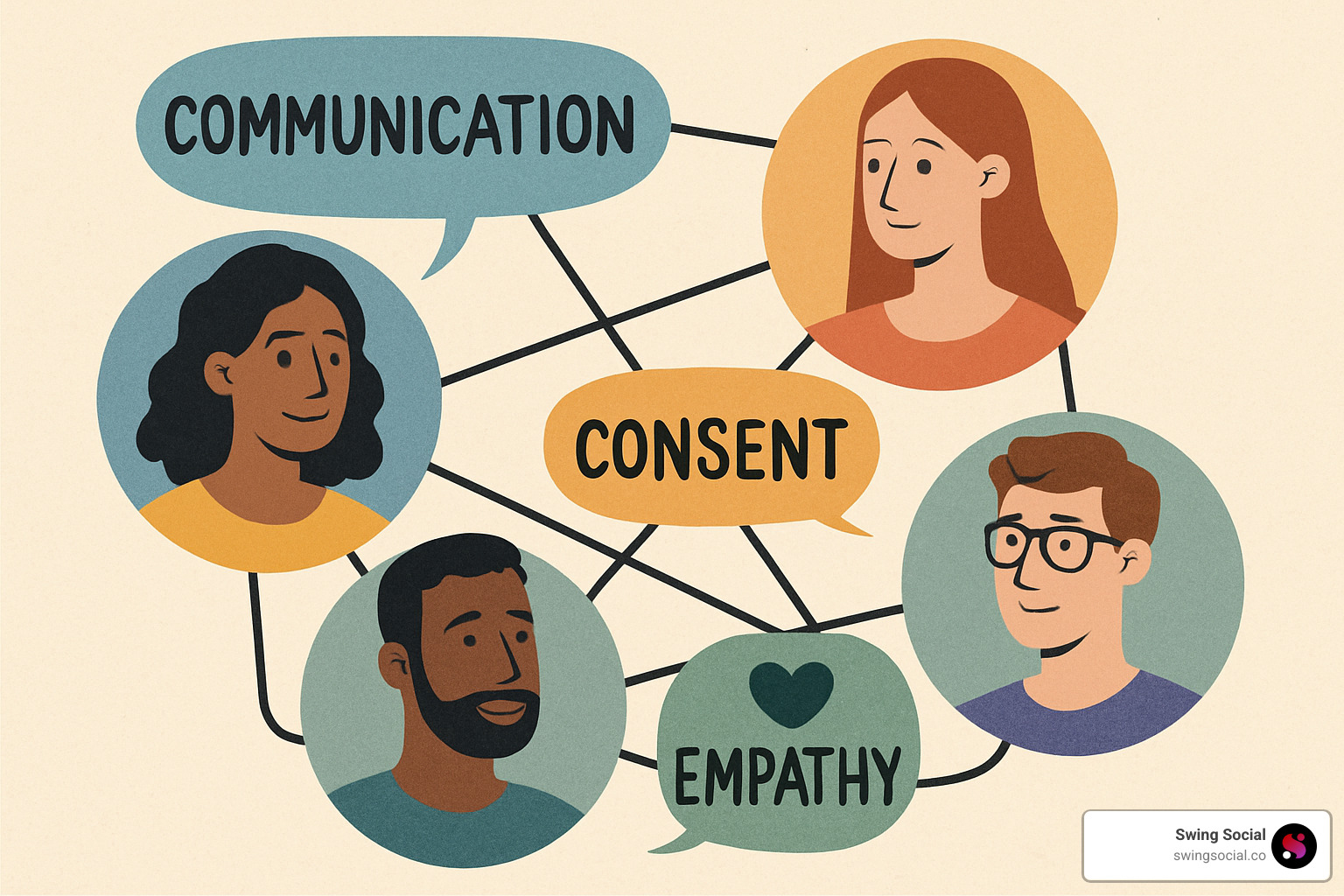
Understanding what does ENM mean is just the beginning. Actually making ethical non-monogamy work requires developing emotional skills that most of us never learned in traditional relationships. It’s like learning to ride a bike while juggling – possible, but it takes practice and patience.
Consent isn’t a checkbox you tick once and forget about. In successful ENM relationships, consent is more like an ongoing conversation that never really ends. Your feelings about boundaries might change after a difficult day at work, or your comfort level with a particular activity might shift as you gain more experience. The key is creating space for these conversations without judgment.
Think of consent as a living, breathing agreement that grows with your relationships. Partners need to feel safe expressing concerns, renegotiating boundaries, or even saying “this isn’t working for me anymore” without fear of anger or abandonment.
Communication in ENM goes way beyond the typical “how was your day?” conversations. You’re essentially becoming a relationship air traffic controller, coordinating not just your own feelings but considering how your actions ripple through your partner’s other connections. This includes everything from practical scheduling (“Can you pick up dinner? My date is running late”) to deeper emotional territory (“I’m feeling insecure about your connection with Alex”).
The magic happens when couples develop what researchers call emotional check-ins – regular conversations about how everyone is feeling about the relationship dynamic. These aren’t interrogations; they’re opportunities to stay connected and address small issues before they become big problems.
Compersion might be the most beautiful concept in ENM, though it’s also the hardest to explain to friends who ask what does ENM mean. Imagine feeling genuinely happy when your partner comes home glowing from a wonderful date with someone else. It’s like the warm feeling you get when your best friend tells you about their new promotion – pure joy for someone you love, without a trace of competition.
Not everyone feels compersion naturally, and that’s completely normal. Many people develop it over time as they become more secure in their own relationships and less threatened by their partner’s happiness with others.
Here’s the reality about jealousy management: people in ENM relationships absolutely do get jealous. The difference is they don’t treat jealousy like a relationship emergency. Instead, they’ve learned to see jealousy as information – maybe it’s highlighting an unmet need, pointing to an insecurity that needs attention, or simply indicating they need more quality time with their partner.
Research on jealousy and stigma shows that people in consensually non-monogamous relationships often develop better strategies for handling jealousy than their monogamous counterparts, simply because they get more practice working through these feelings constructively.
Secure attachment styles tend to make ENM easier, but that doesn’t mean people with anxious or avoidant attachment patterns can’t succeed. It just means they might need extra support, perhaps through therapy or by taking things more slowly as they build confidence in their ability to maintain multiple secure connections.
The practical side matters too. Time and energy management becomes crucial when you’re nurturing multiple relationships while maintaining your own well-being. This isn’t just about calendar management (though color-coded schedules definitely help). It’s about having the emotional bandwidth to be fully present for each partner while not burning yourself out.
Sexual health and safety takes on extra importance when multiple partners are involved. This means regular STI testing, honest communication about sexual activities with other partners, and clear agreements about safer sex practices. Many ENM practitioners use barrier methods with all partners or establish protocols around sharing recent test results before fluid bonding.
The good news? People who successfully steer ENM often report developing communication skills and emotional intelligence that benefit every area of their lives. When you learn to manage multiple loving relationships ethically, you become pretty good at handling conflict, expressing needs clearly, and supporting others through difficult emotions.
For those exploring the swinging lifestyle specifically, communities like Swing Social provide supportive environments where these skills can be developed and practiced with like-minded individuals who understand the unique dynamics of ethical non-monogamy.
Is ENM Right for You? Decision Framework
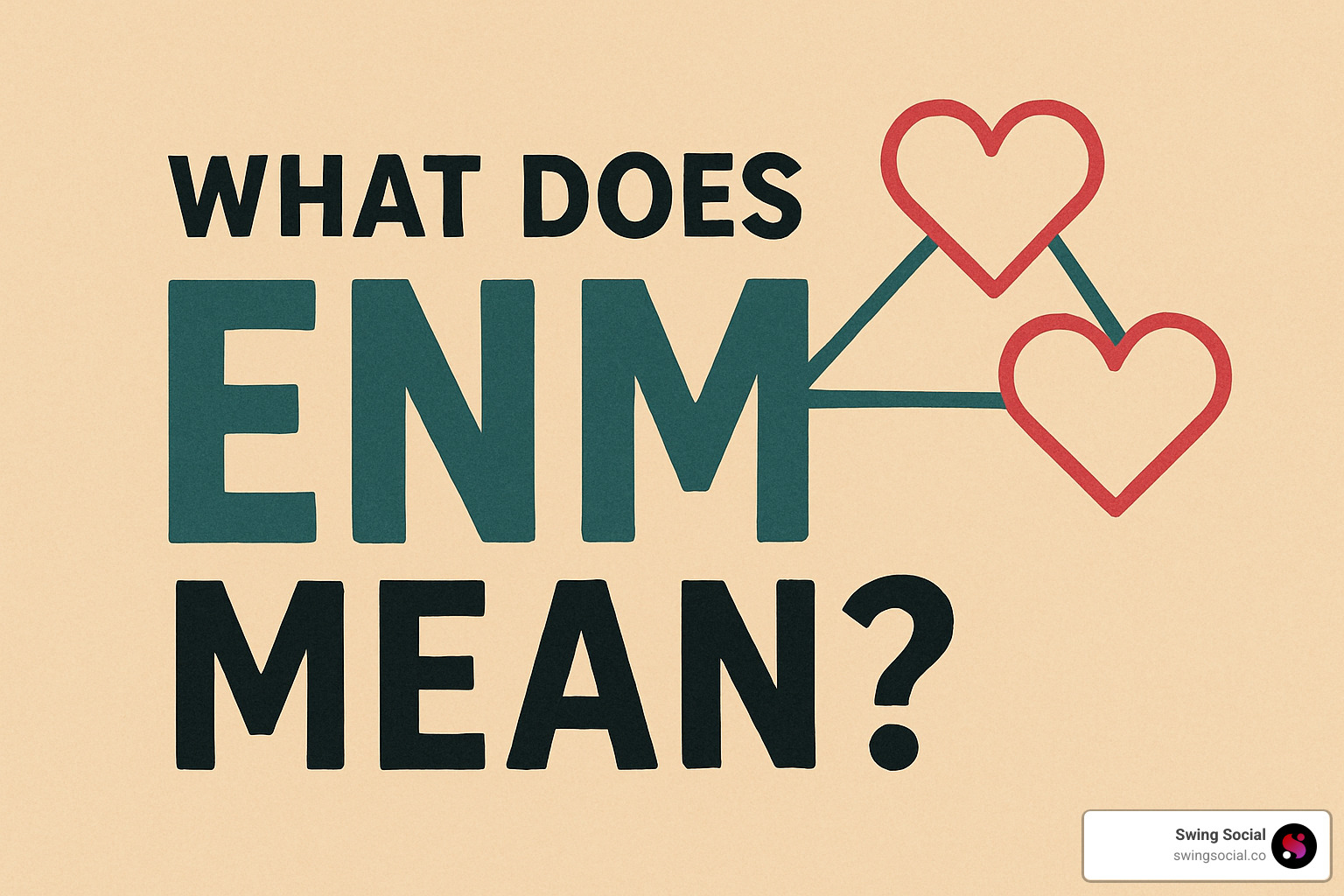
Deciding whether ENM might work for you isn’t a decision to take lightly. It requires honest self-assessment and careful consideration of multiple factors. Here’s a framework to help you think through this decision:
Personal Values Assessment:
Ask yourself why you’re considering ENM. Are you seeking to explore your sexuality, find connections that meet different needs, or challenge societal relationship norms? Or are you hoping ENM will fix problems in your current relationship? ENM works best when it aligns with your authentic values rather than serving as a band-aid for existing issues.
Attachment Style Considerations:
Your attachment style significantly influences how you might experience ENM. People with secure attachment often find it easier to maintain multiple relationships while feeling confident in their connections. If you have anxious attachment, you might struggle with fears of abandonment when your partner is with others. Avoidant attachment might make it difficult to form the deep emotional connections that healthy ENM requires.
Communication Skills Evaluation:
ENM demands exceptional communication abilities. Can you express your needs clearly, listen without becoming defensive, and steer difficult conversations about jealousy or boundaries? If these skills need development, consider working on them before opening your relationship.
Time and Energy Reality Check:
Multiple relationships require significant time and emotional energy. Consider your current life circumstances: career demands, family obligations, social commitments, and personal needs. Do you realistically have the bandwidth to nurture multiple meaningful connections?
Support System Analysis:
ENM can be socially challenging due to stigma and misunderstanding. Do you have friends, family, or community members who would support your choices? Are you prepared to handle potential judgment or discrimination?
Legal and Practical Considerations:
Depending on your location and circumstances, ENM might have legal implications for marriage, custody, employment, or housing. Research the potential consequences in your specific situation.
Professional Support:
Many people benefit from working with a therapist experienced in consensual non-monogamy before and during their ENM journey. This is especially valuable if you’re dealing with jealousy, communication challenges, or past relationship trauma.
Red Flags to Consider:
ENM isn’t right for everyone, and it’s not a solution for relationship problems. Avoid ENM if you’re hoping it will save a failing relationship, if you’re being pressured by a partner, if you struggle with basic relationship skills, or if you’re not prepared for the emotional complexity it involves.
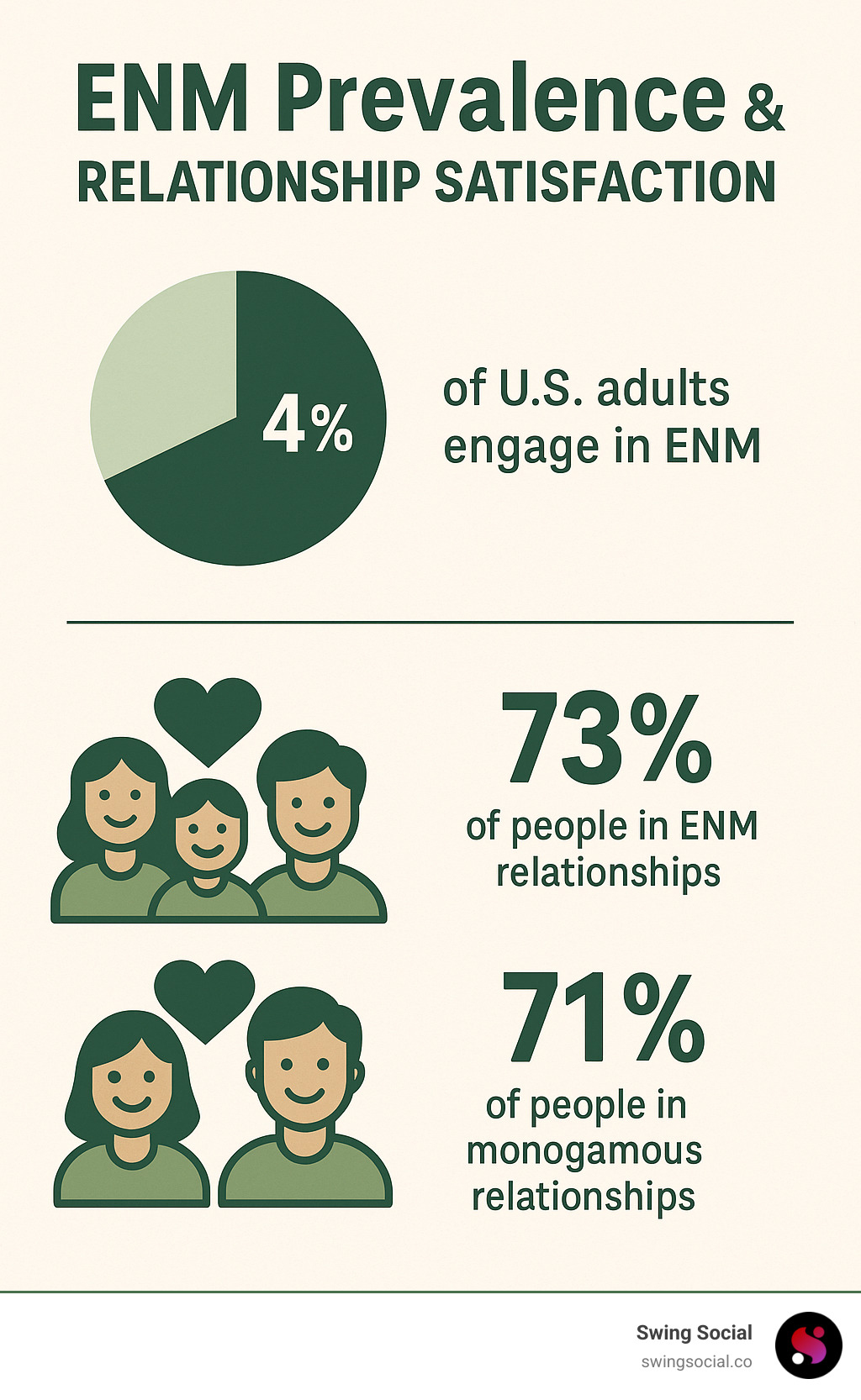
Frequently Asked Questions about what does ENM mean
Is ENM the same as cheating?
What does ENM mean compared to cheating? They’re completely different things, and understanding this distinction is crucial.
The biggest difference comes down to honesty and consent. When someone cheats, they’re sneaking around behind their partner’s back, breaking promises, and violating trust. ENM is the exact opposite – it’s built on complete transparency where everyone knows what’s happening and has agreed to it.
Think about it this way: if you and your partner have an honest conversation and both decide you’re okay with dating other people, that’s ENM. But if you’re secretly texting someone while your partner thinks you’re exclusive, that’s cheating – even if you personally think non-monogamy sounds great.
Cheating involves deception and broken agreements. ENM involves open communication and mutual consent. It’s like the difference between borrowing your friend’s car with permission versus stealing it when they’re not looking.
The emotional impact is different too. Partners in ENM relationships often feel compersion (happiness for their partner’s joy with others), while cheating typically causes devastating betrayal and broken trust.
How common is ENM worldwide?
You might be surprised to learn that ENM is way more common than most people think. The numbers vary depending on how researchers define and measure it, but the data is pretty eye-opening.
In the United States, 3-7% of Americans are actively practicing some form of consensual non-monogamy right now. That might not sound huge, but when you look at lifetime numbers, things get interesting – around 20% of people try ENM at some point in their lives.
Among single Americans specifically, 21.9% report having been in consensually non-monogamous relationships. A 2020 YouGov poll found that about one-third of US adults think their ideal relationship would involve some degree of non-monogamy.
The numbers are growing, especially among younger adults who are more willing to question traditional relationship models. Gen Z and millennials are particularly open to exploring different ways of connecting with people.
Globally, the picture gets more complex. Some cultures have long histories of non-monogamous arrangements, while others strongly emphasize monogamy. In parts of sub-Saharan Africa, about 11% of people live in polygynous arrangements, though this differs significantly from Western-style ENM in terms of equality and personal choice.
What’s clear is that what does ENM mean is becoming a more relevant question as these relationship styles gain visibility and acceptance.
How do people in ENM handle jealousy?
Here’s something that surprises a lot of people: folks in ENM relationships absolutely do feel jealous sometimes. The difference isn’t that they never get jealous – it’s how they deal with those feelings when they come up.
Instead of treating jealousy like a relationship emergency, many ENM practitioners see it as valuable information about their own needs. When that green-eyed monster shows up, they ask themselves what’s really going on underneath.
Self-reflection becomes a superpower. Is the jealousy coming from fear of being abandoned? Worry about not being good enough? Feeling like there’s not enough time together? Once you figure out the root cause, you can actually address the real problem instead of just demanding your partner stop seeing other people.
Communication is absolutely key. Rather than bottling up feelings or issuing ultimatums, people in successful ENM relationships talk openly about their emotions. This might lead to reassurance, adjusting some boundaries, or finding ways to feel more secure in the relationship.
Many people work on developing compersion – that’s the ability to feel genuinely happy when your partner is happy with someone else. It doesn’t come naturally to everyone (totally normal!), but it can be learned with practice and patience.
Having the right support network makes a huge difference too. Friends who understand ENM, online communities, or even therapists who specialize in consensual non-monogamy can provide perspective and emotional support during tough moments.
Sometimes jealousy points to practical issues that are totally fixable – like needing more quality time together or better communication about schedules. The key is seeing jealousy as a normal human emotion that can be worked through, rather than proof that the whole relationship model is doomed.
Conclusion

Understanding what does ENM mean goes far beyond just knowing that it stands for Ethical Non-Monogamy. It’s about recognizing a relationship approach that prioritizes honesty, consent, and respect for all parties involved – values that can strengthen any relationship, whether monogamous or not.
The growing visibility of ENM reflects broader changes in how we think about love, commitment, and personal autonomy. While it’s not right for everyone, the principles underlying ethical non-monogamy – clear communication, ongoing consent, and mutual respect – are valuable for all relationships.
Whether you’re curious about exploring ENM yourself, trying to understand a partner’s interest in it, or simply wanting to steer today’s diverse dating landscape, successful relationships of any style require emotional maturity, excellent communication skills, and genuine care for all involved.
For those interested in exploring the lifestyle aspects of ENM, particularly swinging, platforms like Swing Social provide safe, welcoming communities where like-minded individuals can connect. Our platform serves members across numerous locations worldwide, from Miami and Atlanta to Barcelona and Mykonos, creating opportunities for authentic connections built on mutual respect and shared interests.
The most important takeaway? ENM isn’t about having more partners – it’s about having more honest, ethical relationships. And in a world where authentic connection can be hard to find, that’s something we can all appreciate.
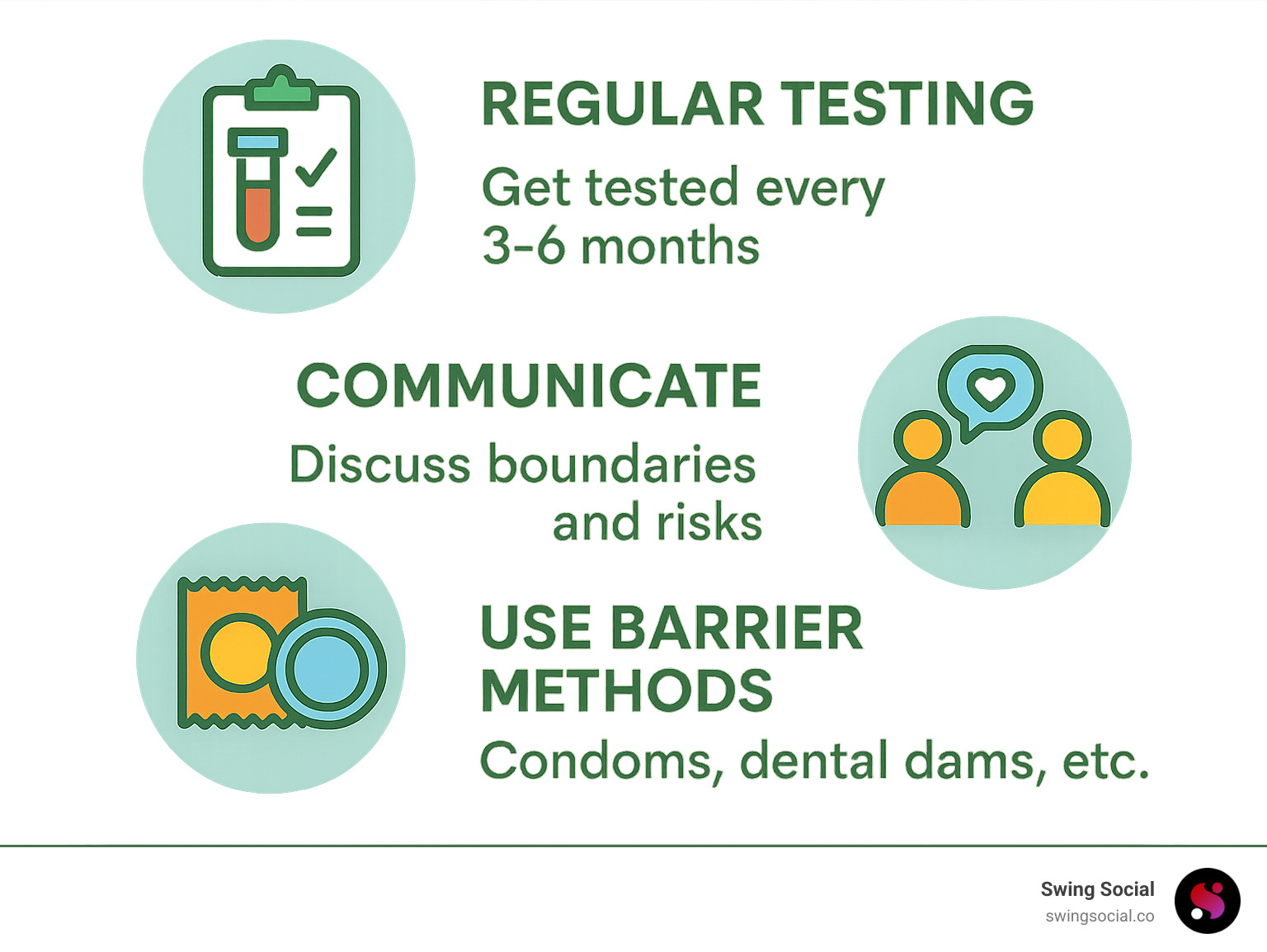
Whatever relationship style you choose, the foundation should always be built on respect, honesty, and genuine care for everyone involved. That’s not just good ENM practice – it’s good human practice.
